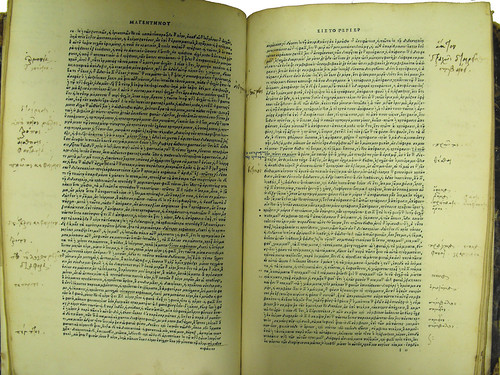Philip Melanchthon
Ammonius Hermiae: Commentaria
[Venice: Apud Aldium, 1503]
Sp Coll Mu50-a.16This volume, which has the bookplate of the Library of the Castle of El-Seghem, Belgium, is inscribed "Melanchthon's copy, with marginal notes", but there is no obvious autograph of Philip Melanchthon, who lived from 1497 to 1560. As a friend and assistant of Martin Luther, Melanchthon helped to systematize the doctrines of the reformed church in his work Loci Communes Theologici and through his lectures encouraged reform of schools and universities.
He was born Philip Schwarzerdt in Bretten, Germany but later came to be known by the Greek version of his name: Melanchthon, meaning Black Earth.
Melanchthon was a humanist scholar par excellence, but he is best known for his theological works and as a great reformer. He wrote three of the Confessions contained in the Collected Confessions of the Lutheran Church (Book of Concord), i.e. the Augsburg Confession, Apology to the Augsburg Confession and the Treatise on the Power and Primacy of the Pope.
The author of the Commentaria, Ammonius Hermiae, lived around AD 440-520. He was a Greek philosopher and taught at Alexandria, and also wrote commentaries on Plato, Aristotle and other great thinkers of the classical world. Such an important work of ancient philosophy would have been a useful resource in Melanchthon's library, particularly in the years when he was lecturing.

Image: Text pages with manuscript notes from Ammonius Hermaie's Commentaria.
Go to the next book in the exhibition, previously owned by: John Donne.


